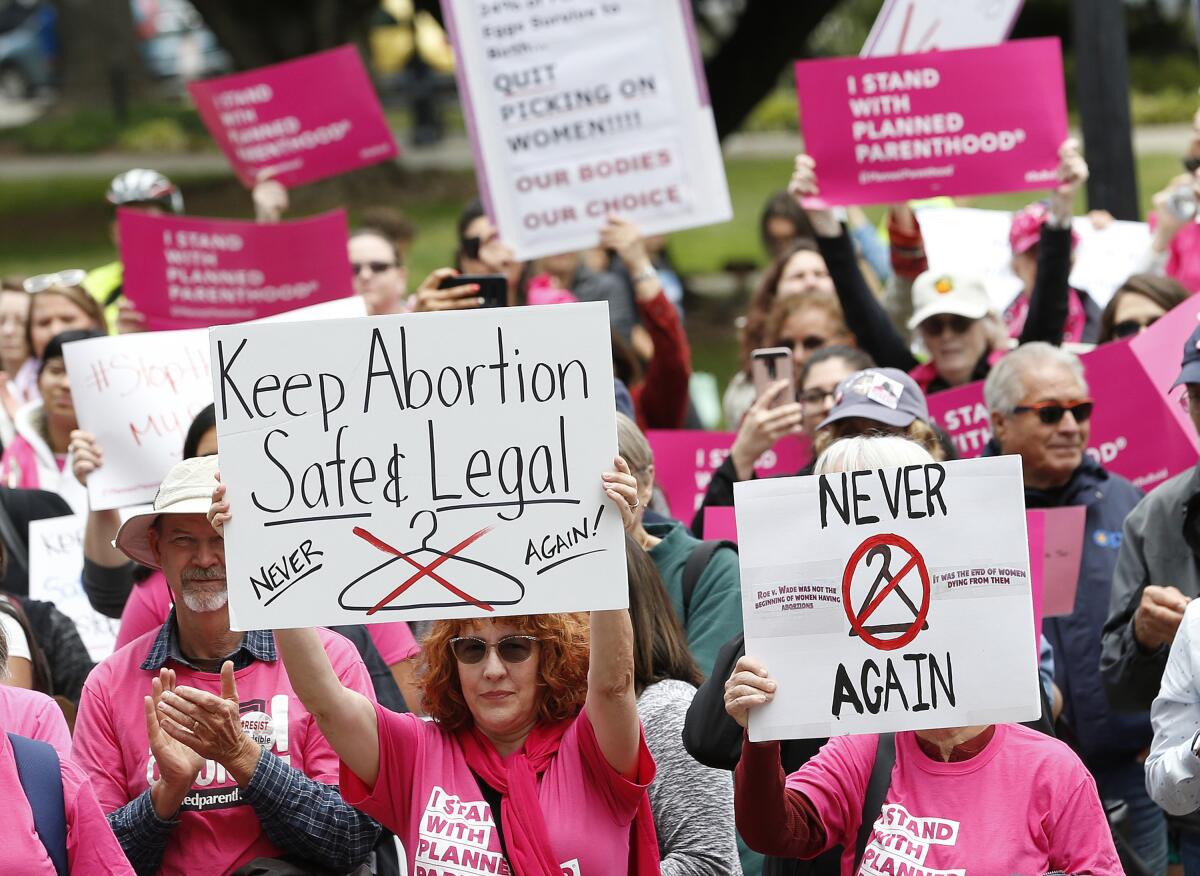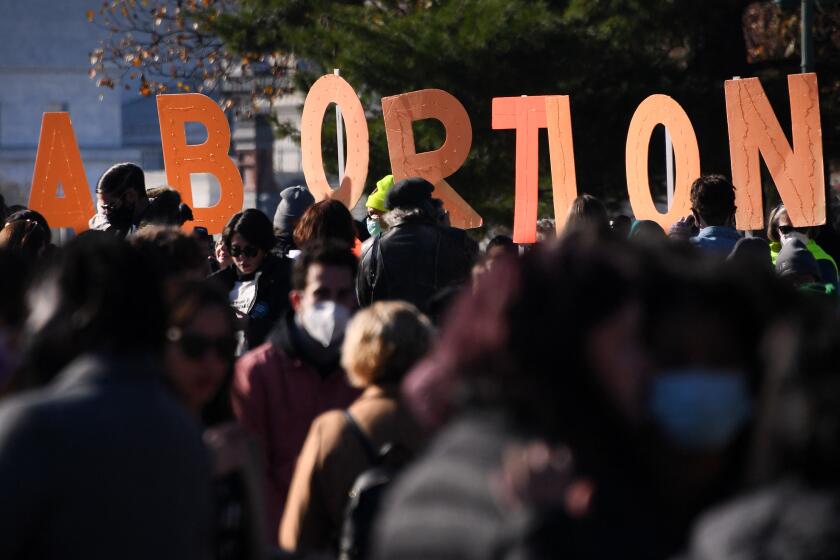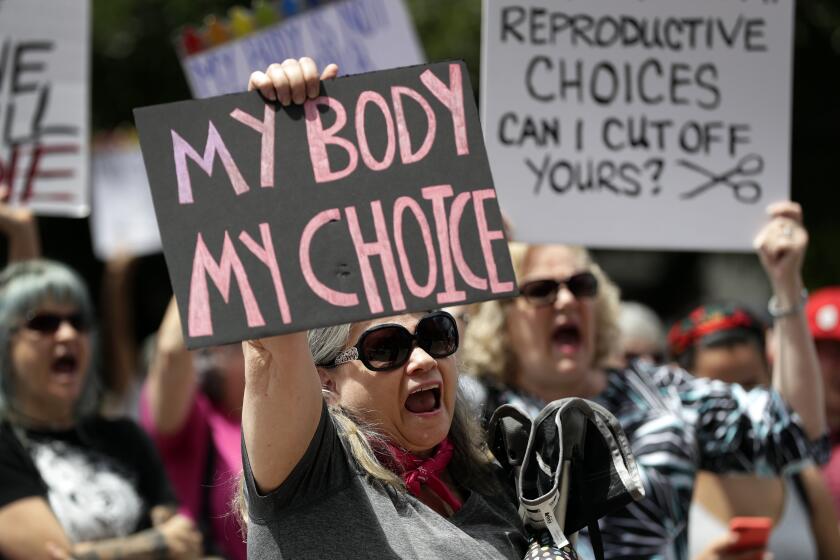Bills aimed at creating California abortion sanctuary headed to Newsom

- Share via
SACRAMENTO — California is on the verge of making it easier for nurse practitioners to provide abortions, barring coroner investigations after a fetal death and dedicating $20 million to expand access to reproductive care programs in Los Angeles County under bills passed by the state Legislature before the body adjourned Wednesday.
Lawmakers sent Gov. Gavin Newsom the last of 15 bills aimed at strengthening California’s already robust abortion protections, two of which were already signed into law. Supporters say the legislation would further cement the state’s efforts to be a “beacon of hope” in the aftermath of the U.S. Supreme Court overturning Roe vs. Wade.
“As judges and lawmakers across the country continue to throw pregnant women into impossible and perilous positions, I am proud that California is resolutely moving in the opposite direction,” said Senate President Pro Tem Toni Atkins (D-San Diego). “Abortion is healthcare — period. And like other medical decisions, it is a private conversation between patients and their healthcare providers.”
California officials began preparing a year ago for the potential effect of Roe vs. Wade being overturned, with Newsom asking Planned Parenthood Affiliates of California and dozens of other supporters to develop a plan for the state to become a sanctuary for anyone denied abortion services in other parts of the country. The bills passed by the Legislature were recommended by that coalition, the California Future of Abortion Council.
In the upcoming session, California legislators hope to push forward Senate Bill 245, which would put an end to out-of-pocket costs paid by those seeking abortions.
Among those bills is Senate Bill 1375 by Atkins, which would allow specifically trained nurse practitioners to perform first trimester abortions without the supervision of a physician. Assembly Bill 2205 by Assemblymember Wendy Carrillo (D-Los Angeles) would create new transparency requirements for health plans participating in Covered California to better understand how much in abortion premiums have been collected and how those have been used to pay claims.
Newsom has until Sept. 30 to sign bills.
“California policymakers continue to prioritize abortion over adoption and parenting,” said Jonathan Keller, president of California Family Council, which opposed all 15 abortion bills. “Sacramento only offers these financial incentives to out-of-state women on the condition they end their pregnancies. This is not pro-choice.”
Antiabortion groups, which opposed the package of legislation, focused their attention on AB 2223, which would prohibit a coroner from holding an inquest after a fetal death, including in cases in which drugs are suspected as causing a stillbirth. Republicans blasted the bill by Assemblymember Buffy Wicks (D-Oakland), saying it would make it difficult for law enforcement to investigate the death of a newborn.
Wicks said pregnancy loss should not be a crime, regardless of the circumstances.
“The reason we did this bill was because we wanted to ensure and enshrine that a no person can be criminally prosecuted for something that happens in utero, which has happened in California,” Wicks said.
SB 1142 by Sen. Anna Caballero (D-Salinas) would create a website with information on abortion services in the state. SB 1245 by Sen. Sydney Kamlager (D-Los Angeles) would set aside $20 million for the Los Angeles County Abortion Access Safe Haven Pilot Program, which would expand reproductive care programs in the county.
That money was included in the $200 million in new funding for reproductive care that lawmakers and Newsom included in the state’s current budget, which will also help pay for abortion services statewide for the uninsured, workforce programs to increase the number of providers and financial assistance to patients traveling from other states. Newsom signed an executive order in June to prevent patient data and medical records from being shared by state agencies in response to any out-of-state investigation into abortion care provided in California.
California law allows a woman to have an abortion until the point that a physician determines “there is a reasonable likelihood of the fetus’ sustained survival outside the uterus without the application of extraordinary medical measures” or if the procedure is necessary in order to “protect the life or health of the woman.” In most cases, doctors have considered a fetus viable at 24 weeks.
While other states restrict abortion and the Supreme Court weighs Roe vs. Wade, California is preparing to serve the country’s abortion patients.
Voters will be able to weigh in on California’s abortion protections in November after lawmakers placed a measure on the ballot that would explicitly protect a person’s right to an abortion. Proposition 1 has strong support among California voters, with a UC Berkeley Institute of Governmental Studies poll showing 7 in 10 voters support it.
The poll also gauged voters’ attitudes toward new laws proposed in the aftermath of the high court’s decision. Nearly two-thirds said they supported legislative fixes that help women from other states obtain an abortion in California.
“I think this is the largest bill package in the country that protects and expands abortion access and it speaks to the commitment the Legislature has had,” said Jodi Hicks, president of Planned Parenthood Affiliates of California. “It speaks to working toward California values to ensure that California remains a reproductive freedom state despite this post-Roe reality we are living in.”
Hicks said abortion providers have seen an uptick in out-of-state patients, particularly in cities where there is an airport and in areas close to Arizona, where the procedure is restricted.
Newsom signed a bill in June that created immediate liability protections for California abortion providers when caring for patients traveling from areas where the procedure is now banned or access is narrowed. Under AB 1666 by Assemblymember Rebecca Bauer-Kahan (D-Orinda), the new law says providers and patients in California can’t be held civilly liable for judgments based on claims made in antiabortion states.
For the record:
2:01 p.m. Sept. 1, 2022An earlier version of this story identified Lena Gonzalez (D-Long Beach) as an Assemblymember. She is a state senator.
In March, Newsom signed SB 245 by Sen. Lena Gonzalez (D-Long Beach), which eliminates out-of-pocket costs for abortions, including co-pays that on average range from $300 for a medication abortion to nearly $900 for a procedural abortion, according to the California Health Benefits Review Program.
“As more and more states institute bans on abortions, California will be the state that continues to see patients coming here to receive care,” Hicks said.
More to Read
Sign up for Essential California
The most important California stories and recommendations in your inbox every morning.
You may occasionally receive promotional content from the Los Angeles Times.













